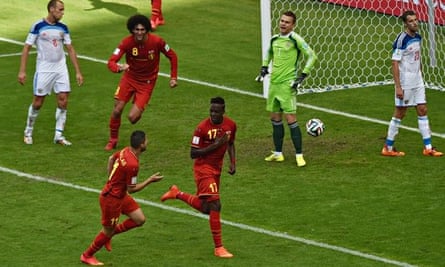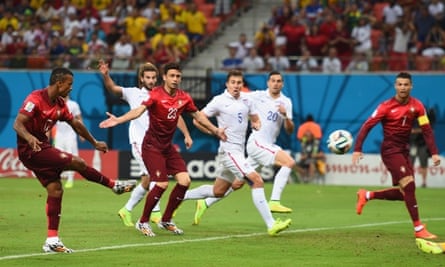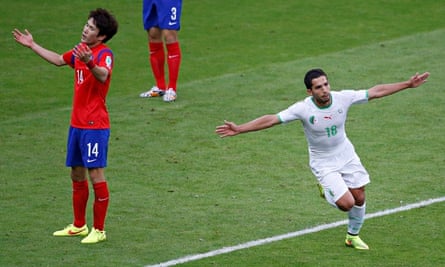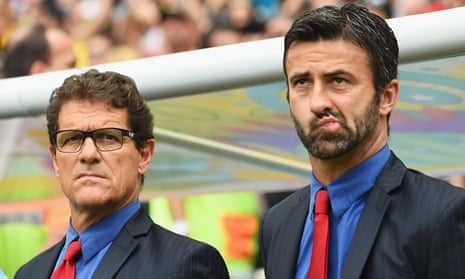Capello’s route to 2018 imperilled
What is it with Fabio Capello at World Cups? Although he has twice qualified impressively, he has been in charge of six games at the finals now, managing one win, three draws and two defeats. His sides have scored a total of four goals. Russia’s players seem to have responded rather better than England’s did to his authoritarian style of leadership but there is perhaps something about the intensity of being shut up with Capello and his methods for weeks on end that saps the spirit from players. Russia looked just as flat as England had four years ago, anxious and devoid of energy or brio. Capello, who has a contract through to 2018, spoke optimistically of this World Cup being an important gauge in seeing where Russia are in preparation for 2018, but on this form you would imagine he will need a good Euros to stay in the job. Jonathan Wilson
• Read Nick Miller’s minute-by-minute report
Origi gives Belgium cutting edge

When Christian Benteke ruptured an achilles tendon in April, the sense of disappointment among the Belgium squad was profound. For the coach, Marc Wilmots, losing his chosen centre forward was an obvious blow. It was generally expected that Jelle Vossen, the 25-year-old Genk striker who had dipped in and out of the national squad over the past few years, would be selected. But in keeping with the atmosphere of youthful talent that makes up the core of the Red Devils, Divock Origi made the cut. Raw, athletic, powerful, with a hammer of a shot, Wilmots felt the 19-year-old was ready for the promotion after just one appearance for Belgium’s Under-21s. Unsurprisingly, Romelu Lukaku became first-choice attacker going into the World Cup (even though he is younger than Benteke, he has almost twice as many caps), but Origi has presented himself as a hugely encouraging alternative. He combined superbly with Eden Hazard, showing clever movement to find the room to rifle in such an important goal to break the deadlock against Russia. He has earned the right to a World Cup start in Belgium’s final group game, against South Korea. Lukaku, naturally, was unhappy to be substituted against Russia, but these two young strikers offer their team a different kind of focal point. Amy Lawrence
Match report: Belgium 1-0 Russia
Portugal failed to learn from the USA’s mistakes
Perhaps the most common criticism of the USA in the wake of their win over Ghana was that they had responded badly to taking the lead so early on, failing to press home their advantage after Clint Dempsey’s first-minute goal. Instead they allowed their opponents to seize control of the game in midfield. It was a lesson that Portugal should have learned. For a few moments after Nani’s fourth-minute goal, Jürgen Klinsmann’s team were on the ropes – chaotic at the back and unable to construct any sequence of passes in the middle of the field. But rather than seek a knock-out blow, Portugal seemed more inclined to drop back and wait for opportunities to counter-punch. That is how they are accustomed to playing under Paulo Bento, but it was not the right approach for this game. With so many key starters missing at the back, they were vulnerable to an aggressive and direct USA team, and especially down the left – where first André Almeida and then Miguel Veloso failed to contain Fabian Johnson. A two-goal lead for Portugal would fundamentally have altered the shape of this game. They nearly got one anyway on the stroke of half-time, when Tim Howard made a world-class save to keep out Nani’s follow-up after the Manchester United player struck a post. But that would have been no reflection of the balance of play. In the end, Portugal were fortunate to steal a point. Paolo Bandini

Match report: USA 2-2 Portugal
Read Graham Parker’s minute-by-minute report
The USA are just fine without Altidore
For all the deficiencies in Jozy Altidore’s game, Klinsmann’s disappointment at losing the striker to a hamstring injury last week was sincere. The striker might not find the net as often as he should, but his hold-up play is highly valued. It was no coincidence that the USA struggled to break down Ghana after he had left the game. In fact they managed just two further touches within 20 yards of the goal; one of which was John Brooks’s 86th-minute winner. But Altidore’s absence from the start against Portugal allowed the USA to take a different approach. Instead of starting with two strikers, Klinsmann stationed Dempsey up front as a lone striker and added width to his midfield, pushing Alejandro Bedoya out to play as a true winger on the left and adding Graham Zusi on the right. Neither player put in a flawless performance, but their presence was fundamental to the way that the USA attacked Portugal, with both full-backs – especially Johnson – overlapping to devastating effect. There is no guarantee that Klinsmann will stick with this shape from here on in – different approaches are required to break down different opponents, after all – but Sunday’s draw certainly showed that the USA have more strings to their tactical bow. PB
Klinsmann vows to go on attack against Germany
The legacy of South Africa 2010
Sport administrators are always keen to stress the legacy of major sporting events, no wonder when the tournaments themselves cost the host nations millions, that they can often ill afford. Success on the field is unsurprisingly a priority for many of the population – so what of South Africa 2010, Africa’s World Cup that was supposed to help kickstart the rise to prominence of the continent’s football teams? South Africa didn’t even qualify this time, Cameroon have been stuck in an unsightly internal squabble and Ghana put up a good fight against Germany but will need to beat Portugal to stand a chance of qualifying. Ivory Coast are well–placed but it seems like the last gasp of the golden generation of Yaya Touré and Didier Drogba, rather than a sign of good things to come, while Nigeria got very lucky against Bosnia to put themselves in the driving seat for second place in Group F, behind Argentina.

Algeria are the top-ranked African nation by Fifa, so they should be flying the flag – and after the narrow defeat to Belgium, they put in a fabulously entertaining display to dispatch South Korea 4-2. Sure, the defending was wobbly at times, and South Korea’s centre-back pairing was atrocious, but it was the first time an African side have scored four goals at a World Cup, and may well help Algeria through to the second round. The last 16 could boast as many African as European sides which would be a triumph for the continent – and a real sign of progress. It is easy to sniff at Fifa’s lofty aspirations – and most of the time they deserve it – but 2014 could be the World Cup where African football takes a mighty stride forward. Toby Moses
Match report: South Korea 2-4 Algeria
Read Toby Moses’ minute-by-minute report

Comments (…)
Sign in or create your Guardian account to join the discussion